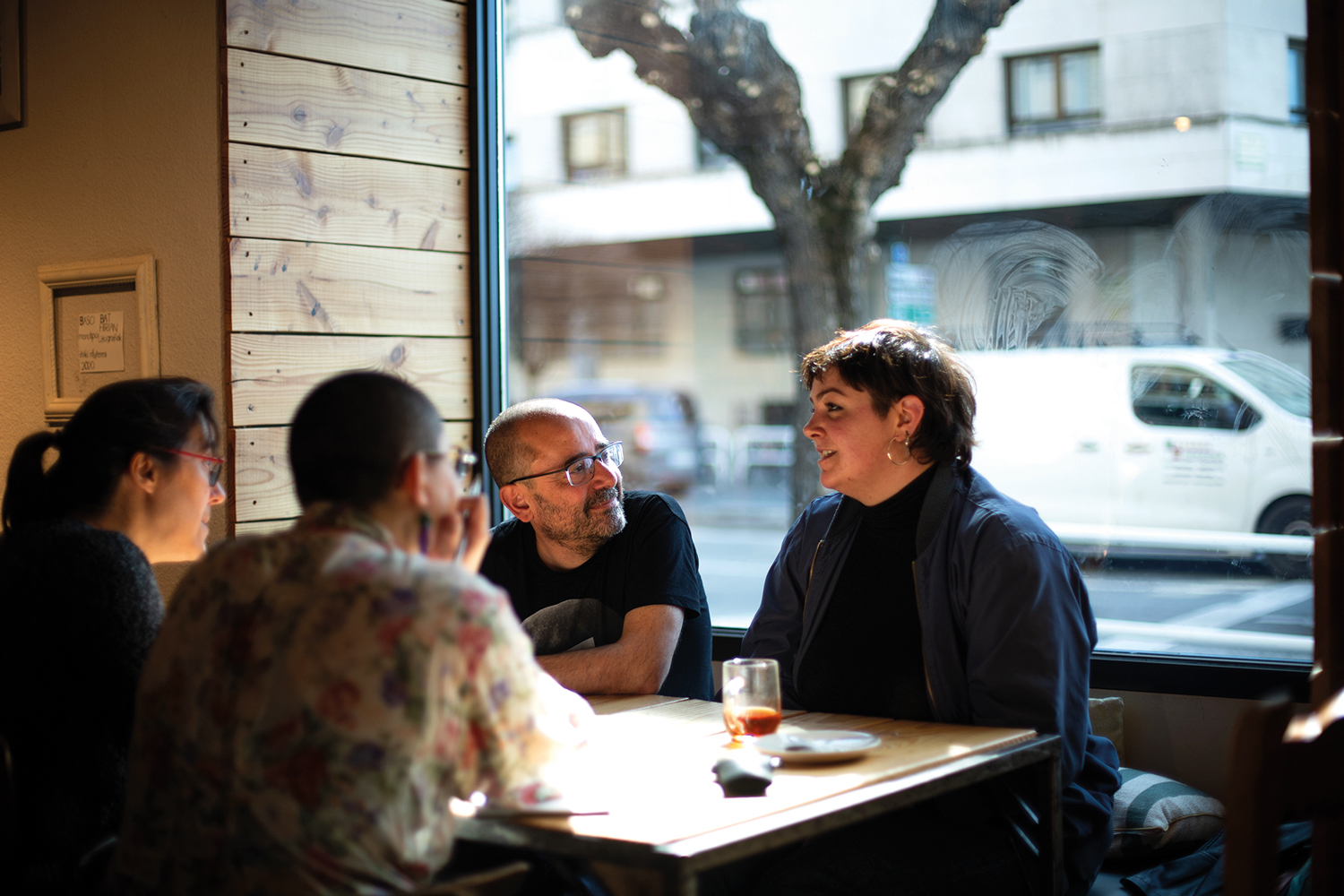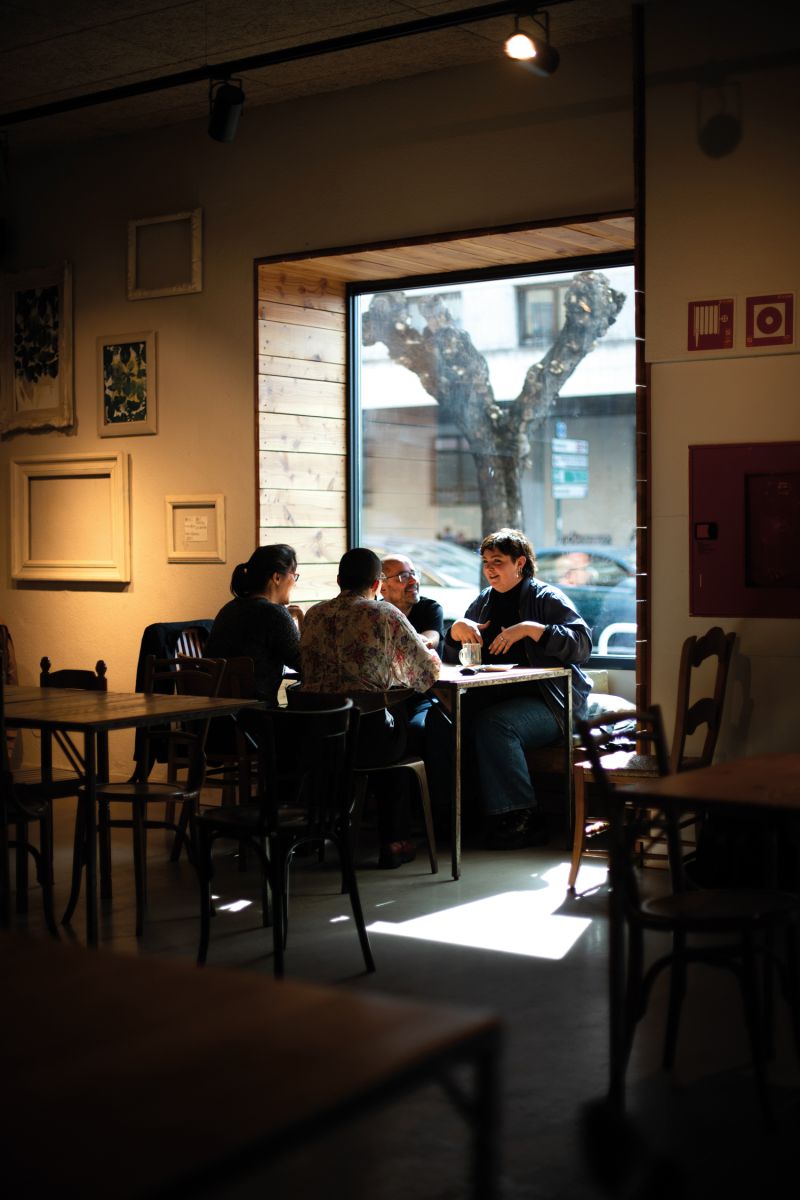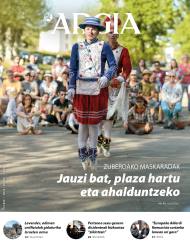Basque occupation for marisolast
- Words change year after generation, and with them the meaning of words. There are many ways to call yourself: soropil, biziosa, marioker, nonbinary, maritxu, etc. The sexual dissidents Maiana Etxeberri Keufterian, Amaia Alvarez Uria and Kepa Yecora Jimenez have spoken of the Basque language to meet the needs of dissident sex people.

How do Euskera combine with sexual dissent? If the Basque country does not meet the needs of dissident sex people, what resources are there for linguistic recovery? What influence does academia and correction have? Maiana Etxeberri, a member of the collective Altxalili (Behastunes-Laphizketa, Nafarroa Beherea, 1993), the Basque philosopher Amaia Alvarez (Bilbao, 1978) and Kepa Yecora, a member of the Basque Country Sexual Liberation Movement EHGAM, was a professor. When Euskera does not meet the needs of society, they have occupied Euskera and have highlighted three ways to do so: the words that already exist, but are not known; those that come from languages other than Euskera; and those that have invented dissident sexual genres. “All three are important, but we must look at whether the words there are so far meet our needs,” explains Yecora. Many of the words used in the LGTBIAQ+ movement in the Basque Country
are loans received from Spanish, French and English. For example, Álvarez, in his youth, used especially gays and lesbians, but the new generations have begun to use the bolle – he says in French –, the marica, the violet, etc. Together with journalist June Fernandez How to say/have a Basque hat? through the project, words have been searched, created and collected to name themselves and practices in Basque. Besides collecting experiences, they have created a dictionary with the words that emerge in the different groups: “We use loans when we lack or do not know the words. Why don't we create loans?" That's what they wondered when the project started. There are many words in the dictionary. Marioker is Álvarez’s proposal to name kuir people. Turf, on the other hand, is
a contribution of the Katalinak bizikletan group to use it as an alternative in Basque to bolle. Alvarez explained to us: “Catalina created a bicycle to create a safe space for women and bibolloas. We did mechanic workshops there. We create by playing with words creativity and pastries. He had a short tour, but arrived in Pamplona.” The word was created in 2010, but it is not currently used. Alvarez's proposal to name a heterosexual woman eager or eager to have a lesbian relationship experience. It's equivalent to heterocurea in Spanish. Another word is pecatorous, which means a scholar and is the title of the graphic book of the cartoonist Dom Campistron. LGTBIAQ+ proposes its use to designate people as a response to the exclusion promoted by the hegemonic Catholic religion.
Maiana Etxeberri: “We share questionnaires and play word games to learn Basque and play with words”
As
Yecora explained a political option, in the 1960s they mainly used the word homosexual, and gradually began to assimilate the words gay and maricón: “Over the years we have seen the political value of words and we have begun to redirect insults.” Now we talk about who they are in many ways, like paddle, maritxu, marimutil, and we start using marioker: “Now I feel comfortable naming myself maritxu because it is a political choice.” Etxeberri is a “classic” rural world, and as a result he has
been naming himself for many years: “In Euskal Herria I found no tenderness to discover me. All of this I've been discovering in sexilium." He has recently returned to Euskal Herria with the words lesbians and lambs. In Ipar Euskal Herria he stresses that the word lesbian has the same strength as in Hego Euskal Herria: “In Ipar Euskal Herria and in France being
a lesbian is still a great taboo and is very negative”. In fact, the kuir movement is coming step by step to Ipar Euskal Herria: “Youth is taking place and freedom.” According to Etxeberri, although in the last fifteen years some places have not changed much, collectives and spaces are emerging “for small”: “They have come in a very nice and loving way, and they have a very nice influence”. Examples are Bekat’uros besta and Altxalili and the collective jewelry. Bekat’uros is the first day of last year in Atharratz (Zuberoa), where the Altxalili show was presented. Altxalili is
an LGTBIAQ+ collective that is born in rural areas, and it is a space to question identities and a grasp for Etxeberri: “We share questionnaires and we do word games to conquer the Basque country and play with words, like mileskuir, milthanks and onegouine, gouine da bollera in French”. In addition, Altxalil is a place to be “quieter” in non-binarism: “We play with borders and cabaret helps us to create representations. Sometimes they have approached
me because they don’t know if I am a woman or a man, and that’s a treasure for me.”

Xoka: Hitano Nonbinary Although the Basque Country has tools to escape gender binarism, they have highlighted that it marks gender as other languages. In fact, there are also words in Basque with gender brands like sister, sister, sister or brother. “In Basque we have family and children,” said Álvarez. Yecora, on the other hand, sometimes uses his sister: “Neither his sister nor his sister.” In the search for the Basque without gender marks, EHGAM members have invented the rope. It is
a proposal to create a nonbinary Hitano that seeks to use x instead of toka or noka. That is, replacing “I liked it” or “I liked it” with “I liked it” with non-binary people. “More and more people are named non-binary, and one of our concerns has been the need
to adapt language to current forms. They are looking for formulas in Spanish, Italian and Catalan, and we too,” explains Yecora. However, he considers that the road remains “long”. The rope. They celebrated a conference of dissident jite in the space Laba de Pamplona, in which sexual dissidents and Euskera were combined, and in which the film was presented: “We have moved the corners and there is resistance, but despite what others say, as on other occasions, we will not turn around.”
Amaia Alvarez Uria: “We have to dirty the Basque and then we will see what has strength”
In Spanish, the neutral genre is used by letter e, in French, zeal and Catalan
i. “Iel is used in very political and dissident contexts,” explains Etxeberri. That’s why he doesn’t dare to use it in certain areas: “It’s hard to name myself vollera and coarse, and that’s great work with people. If I added non-interity, I would be overweight.” Instead of using the neutral, try to change the order of phrases until you find formulas without gender marks. From word games to practice There are many proposals on the table, and according to
Amaia Álvarez “little by little” you will see who makes the way: “Now is the time to see what proposals draw our attention, what we want to try and who makes the way. They are thinking very nice heads and hearts.”
Alvarez
has created the word Marioker to define the kuir people, and is already making his way: “It has been very nice to see that mariokers are used”. In addition to its use on the street, Marioker has given it the form of a book: How to say/be the Basque mouthpiece? through the book. There are words that take the form of a book and others that take the form of a song. An example of this is the Tuli-tuli song that Yogurinha Borova and Albina Stardust have jointly performed. Yecora has
participated in the first draft of the song. The Marichos called tuli-tuli to refer to ligation in the 1980s. The EHGAM mari prefix is widely used by Yecora: “Maritopetak, marimenu, maribazkaria and others”. With this they want to show the diversity: “It is not just being a Maricon, we can be mariokers, maritransas, etc.” In contrast, Altxalilin uses the kuir suffix, such as mileskuir and korrikuir.
About the use of choco Kepa Yecora: “We have moved corners and there is resistance, but despite what others say, we will not give up”
The need to kill Euskaltzaina Some words give the way and others do not, but to do so he believes that we have to “experience” and “play”: “We have to dirty the Basque, and then we will see what
has strength”. To do this, we must look at the Basque Language Academy of all Basques: “As Asisko Urmeneta says, inside we have an academic who always reminds us that we have to comply with the rules”. This, both individually and collectively, is a “great tension”: “We have to kill the inner scholar.” Yecora has joined in this and has underlined the need to analyse what kind of words and ways to achieve a “really cool” language: “Let us not always follow Euskaltzaindia, if languages do not meet our needs we will have to take them.” He also believes that we must look at the spaces: “We must also occupy nearby places. Sexilium is usually
done in large spaces, where the main language is not the Basque”. Etxeberri joins this and adds that Euskera should be fed with words of the past, the
present and the future. He adds that the inner scholar killed “real” as a child: “At home they spoke French and in the ikastola I didn’t have a good time. I thought it wasn’t good for me in Basque and it wasn’t clean.” He has felt very oppressed to school, and as oppression was “excessively violent”, he had to leave school for a while: “I have hated the Basque Country and the Basque Country, while feeling very active to live in the Basque country.” It has always had a conflict: “I want Euskal Herria and I want to live as a Basque, but since I have
been so oppressed I cannot feel healthy and respected.”

Therefore, the creation of Altxalil in the rural world has made him “a great good” and has helped calm his relationship with the language and with the Basque Country: “It helps me to live and breathe in Basque. Altxalil’s influence on the rural world is enormous.” In addition, the collective is a place to create new words and look for new identification formulas.
Álvarez is a professor at the UPV/EHU and says that students connect the Basque language to the school and that outside it they do it in Spanish: “They do not feel identified with the Basque language because they relate it to the school”. Therefore, he believes that the link between the school and the Basque country must be broken and extended to other spaces: “We have seen with Mariokerrak that the Basque country is increasingly used in militancy”. He adds that there are several stages to the acquisition of the language: “If I lack the words, I will invent them or take them from another language, and if I am not able to do anything in Basque, I will get wet and dirty in Spanish until little by little I do not need Spanish”. Etxeberri says the process of playing with words comes out of “natural” and “very pleasure.”
Yecora joins “Profitamos to have fun and laugh. It says, "If you don't dance, it's not my revolution," because if we don't laugh, it's not my revolution." He adds that dissident sexual genres have always been “provocative”: “Struggle is not the way, the way is provocation. When individuals do, there's more risk, but being in a group, we're strengthened and empowered. I admire and thank you very much for what you do in Altxalil.” Etxeberri adds that they do it “with love.” “And of humor,” adds Álvarez. They salute themselves in smiles and say mileskuir.














